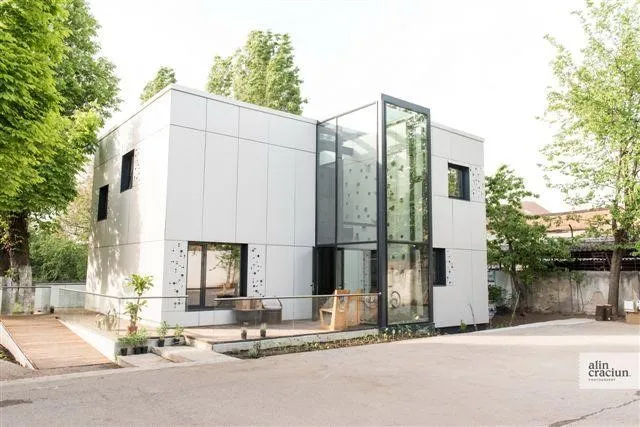- Access to windows overlooking outside improves people's memory by 10-25%
- Natural light helps increase sales in stores by 15-40%
- Appropriate room ventilation increases productivity by 5-14%

Bucharest, 19 July 2017 – EFdeN has released the Comfort Conditions Guide with the support of BCR Banca Pentru Locuinţe (BCR BpL), document whose sole purpose is to improve the quality of living in Romania.
"We need to realize that Romania has the oldest stock of housing in the EU, according to Eurostat data. We have blocks of flats where no repairs have been done in the past 20-30 years. Most of these blocks need urgent repairs. That is why we decided to get involved in supporting this Guide, which we consider extremely useful", says Lucian Anghel, President of BCR Banca pentru Locuinţe.
Bucharest, 19 July 2017 – EFdeN has released the Comfort Conditions Guide with the support of BCR Banca Pentru Locuinţe (BCR BpL), document whose sole purpose is to improve the quality of living in Romania.
"We need to realize that Romania has the oldest stock of housing in the EU, according to Eurostat data. We have blocks of flats where no repairs have been done in the past 20-30 years. Most of these blocks need urgent repairs. That is why we decided to get involved in supporting this Guide, which we consider extremely useful", says Lucian Anghel, President of BCR Banca pentru Locuinţe.

The Comfort Conditions Guide aims to inform the public on the importance of indoor comfort, the factors that determine it, how it can influence the productivity and health of the inhabitants and the parameters to be taken into consideration inside the home. The case study, carried out on the EFdeN prototype, illustrates these parameters and demonstrates their application with low energy consumption through innovative solutions such as phase changing materials, ventilated façade, thermal mass and performance equipment. The efficiency of structural and architectural solutions and their interaction with active systems contribute to achieving the comfort of occupants of the building.
"Ensuring adequate indoor comfort is very important because people spend about 85% of their time inside the buildings. Whether we are talking about work, sleep, shopping, fitness or other domestic activities, buildings have a critical influence on our safety, health and productivity", said Ana-Maria Ghiţă, General Manager of FFdeN.
EFdeN 4C - the Research Center for Comfort Conditions, was born in 2015, with the completion of the reconstruction of the solar house prototype designed and built by the EFdeN team. More than 400 students have worked in a multidisciplinary manner, with the support of professors from the Technical University of Civil Engineering in Bucharest and "Ion Mincu" University of Architecture and Urbanism, to build a solar house, 100% electric, safe and comfortable, with a low CO2 footprint, a house that produces more energy than consumes and uses the most environmentally friendly materials. Currently, this is the subject of applied monitoring and research programs and a platform for young students, master students or PhD students to implement their research ideas. Their results will be made available to the public for use in improving indoor comfort parameters in Romania's homes.
A study of the World Council for Green Buildings (WorldGBC) from 2014 shows that:
Access to windows overlooking outside:
- Improves cognitive functions and memory by 10-25%
- In hospitals - reduces hospitalization by 8.5%
Natural light
- At work - increases workers' productivity by 18%
- At school - improves students' performance by 5-14%
- In stores - increases sales by 15-40%
Building systems
- Appropriate Artificial Lighting - increases productivity by 23%
- Appropriate ventilation - increases productivity by 5-14%
- Individual temperature control - increases productivity by 3%
"Although there are certain values for comfort parameters generally accepted, Thermal Comfort, Air Quality, Acoustic Comfort and Visual Comfort, parameters that are found in the building design norms, often these parameters that determine the comfort of the occupants of the buildings are not taken into account", said Mihai Băiceanu, EFdeN 4C Research Programs Coordinator.
Comfort is defined as a state of good physical and mental mood, due to external factors, which can be of multiple natures, but satisfaction with the indoor environment is a subjective notion, which depends on the physiology of each person. Deficient buildings are common in terms of one or more categories of comfort: thermal comfort, air quality, acoustic comfort, visual comfort, in many cases involving even the Sick Buildings Syndrome.
According to a recent study conducted by IRSOP for the Association of Housing Banks in Romania, 84% of respondents mentioned at least one problem with the dwelling and 91% bought at least one necessary repair product: paint, silicone, sanitary items, floor tiles, faience, cement etc. The biggest problems with housing occur in poor households, with incomes below RON 3,000 per household.
Although the cost of building materials used to renovate houses is similar to that in the countries of the region, the average gross monthly wage in our country is over six times lower than in Austria and almost twice lower than in Slovakia or the Czech Republic, Lucian Anghel said.
BCR Banca pentru Locuinte (BCR BpL) decided to support, since the end of last year, the activity of EFdeN 4C - the Research Center for Comfort Conditions in Romania, because, according to INS, 34% of the rural households do not have a sanitary group, and in the case of urban dwellings the percentage is 8.5%, while 32% do not have indoor bath/shower. At the same time, around 16% of households face severe housing problems, such as deterioration, dampness, leakage of water and sewage networks and insufficient light.
* *
BCR - External Communication
Cezar Marin, e-mail: cezar.marin@bcr.ro
This information is also available on our webpage, at: www.bcr.ro
For details on BCR products and services, please use the following contact methods
InfoBCR
Web: www.bcr.ro
Email: contact.center@bcr.ro
TelVerde: 0800.801.BCR (0800.801.227), toll free in all national networks
Twitter: @infoBCR